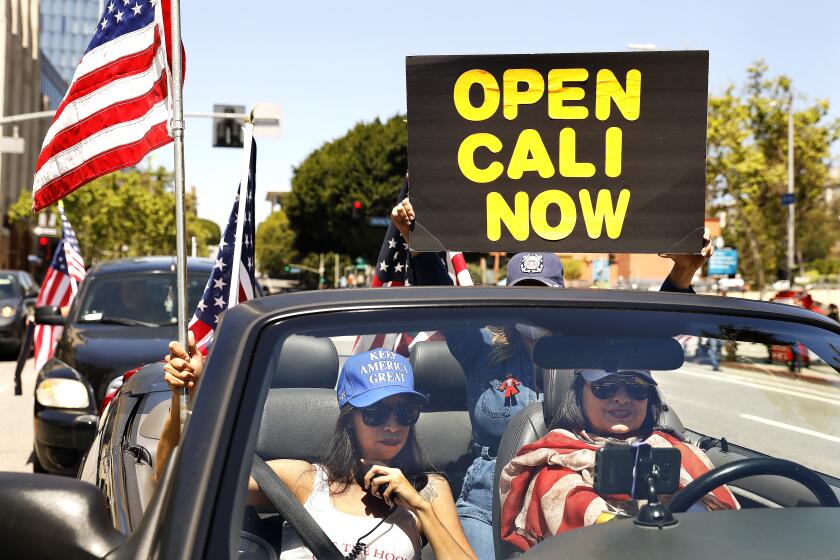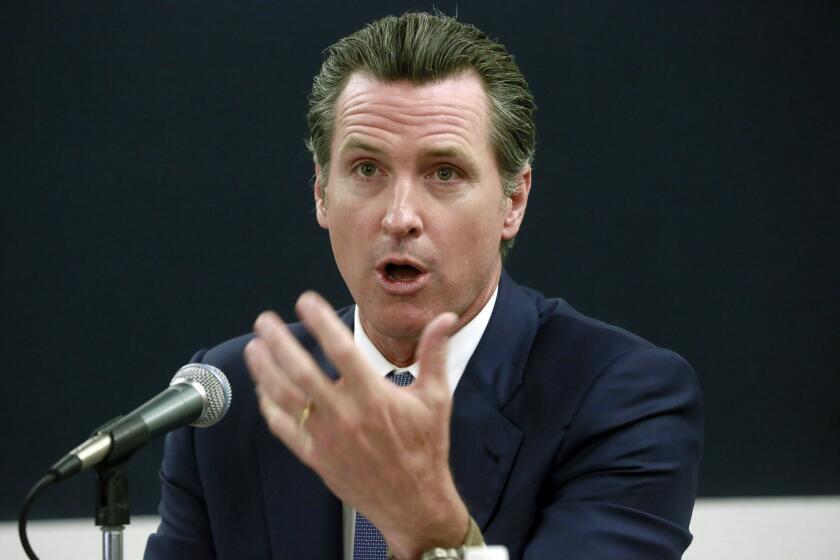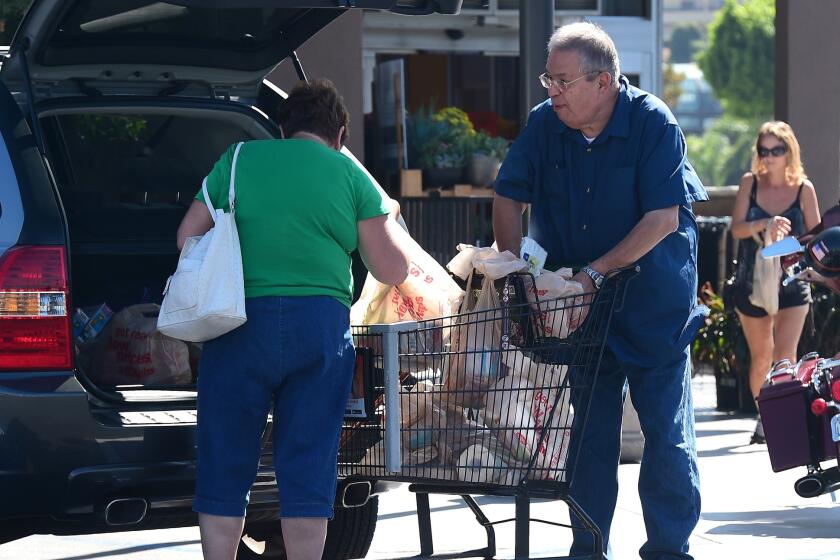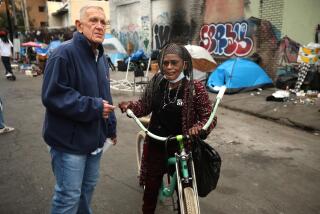‘We aren’t the dumping ground’: Homeless people fleeing coronavirus meet NIMBY resistance
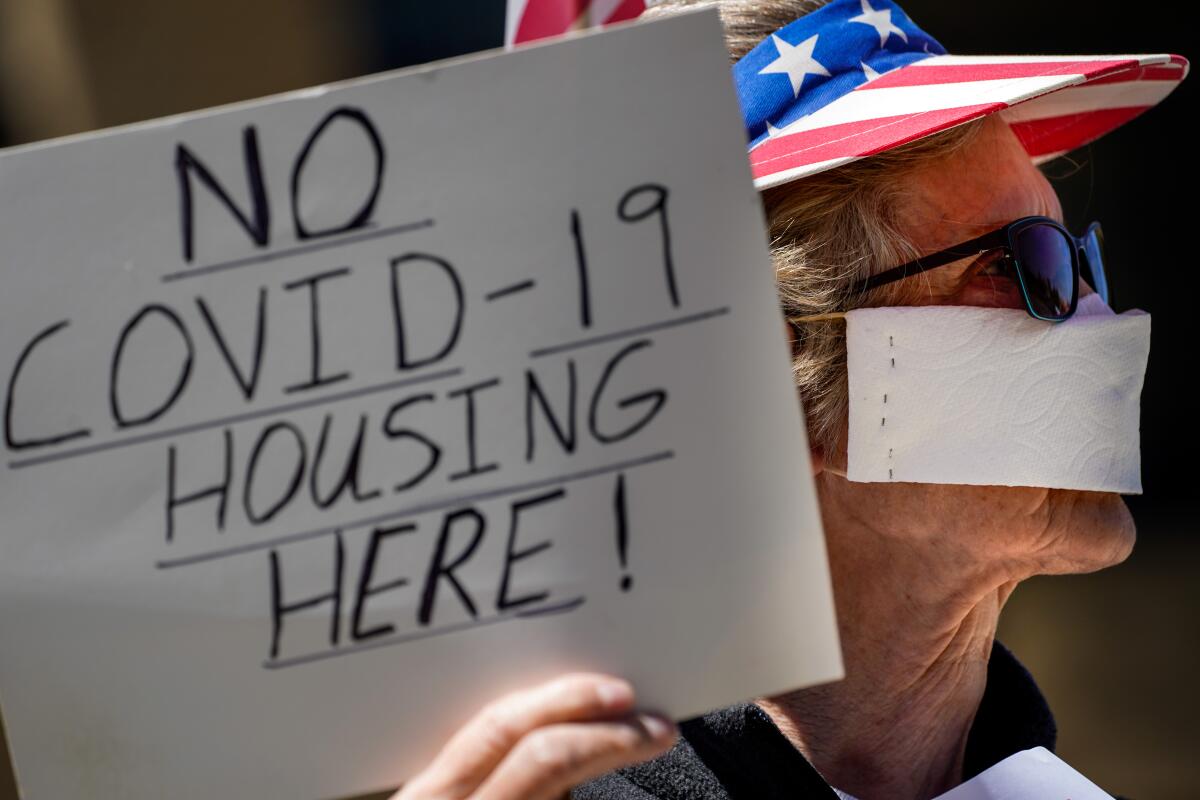
- Share via
When officials in the South Bay city of Lawndale learned that a hotel on its main drag had been leased to Los Angeles County to house homeless people at high risk for the coronavirus, their reaction wasn’t to put out a welcome mat.
Rather, in an April 14 letter to the hotel’s owner, the city attorney said that if he did not break the lease by the next day, a hearing would be called to consider revoking the hotel’s operating permit.
Such opposition at the local level has become more common as coronavirus cases have multiplied in recent weeks and a statewide program to move thousands of homeless people into vacant hotels and motels has gotten off the ground.
Gov. Gavin Newsom raised the issue last weekend while announcing that the Motel 6 chain had offered to house homeless people in 47 motels in 19 counties throughout California.
“Cities that are blocking those efforts,” he said, without naming names, “please consider the morality of those decisions.”
In Los Angeles County, which the governor has singled out as doing a good job, more than 2,000 hotel rooms are now under lease and a team of negotiators is working on deals with dozens of other owners in communities large and small. Officials have set an aggressive goal of getting 15,000 people into hotel rooms — a figure that would match in a single county the statewide goal set by Newsom for what he calls Project Roomkey.
About half of the 12 hotels now operating in the county are in the city of Los Angeles, where Mayor Eric Garcetti is recruiting participation. Half a dozen smaller cities — from Lancaster to Lomita — also have welcomed, or at least not opposed, hotels temporarily hosting people with nowhere else to go.
But it hasn’t all gone that smoothly. Sometimes the deals to lease hotels, which are typically conducted without formal public proceedings, have run into fears that homeless people will be brought in from other cities, disrupt neighborhoods and then be freed to wander local streets after the COVID-19 pandemic passes.
California reopening: Organizer of protest against California stay-at-home rules could face criminal charges
Neighborhood groups have come out in opposition when word of a lease has spread. In the city of Laguna Woods, for example, protesters from a gated Orange County retirement community successfully shot down a plan to house homeless residents in a nearby hotel.
Also in Orange County, the city of Laguna Hills sued to try to block county officials from signing a contract with a hotel to house at-risk homeless residents, contending that the building would be a public nuisance. A judge rejected their argument this week and ruled the contract should go forward during the state of emergency declared for the coronavirus.
In the Inland Empire, the city of Ontario is mandating that any hotel that agrees to house homeless people who are at risk for the coronavirus must erect a fence. Dan Bell, a spokesman for the city, said the plan is to control access to any such hotel-turned-shelter, not to block it from opening.
In Norwalk, city officials passed a moratorium to prohibit hotels and motels from being used for homeless housing or coronavirus patients “without prior city approval.” Los Angeles County filed a complaint against the city on Thursday, seeking to overturn the moratorium and arguing that it was aimed at a specific hotel that had already signed a lease.
Skip Miller, an attorney hired to file the complaint in L.A. County Superior Court, called the city’s attempt to block Project Roomkey outrageous.
“I don’t know who they think they are,” he said.
In San Bernardino County, officials reached a deal with a 50-room hotel along a commercial strip in the city of San Bernardino and are housing homeless people there. But City Council members have reacted angrily to any attempt to expand the effort, contending that the county is singling out their city to bring in more homeless people.
Conservative group sues to block California Gov. Newsom’s plan to allocate $75 million in coronavirus aid to immigrants in the country illegally.
“We aren’t the dumping ground,” City Councilwoman Bessine Richard said at a recent meeting.
Some wealthier neighborhoods in Los Angeles also are protesting initiatives to shelter homeless people.
In Pacific Palisades, a resident has filed a lawsuit seeking to block city officials from moving homeless people into the Palisades Recreation Center, saying that such a shelter would create a public nuisance and could violate laws regulating the disclosure of information about the movements of sex offenders, according to the filing. Also, residents in Cheviot Hills on Wednesday submitted a petition with more than 1,000 signatures to Garcetti, voicing concerns about the use of RVs for homeless people in the parking lot of a recreation center that’s already being used as a temporary shelter.
In Lawndale, Mayor Robert Pullen-Miles defended the city’s actions, saying it has a record of providing services and being sensitive to the homeless population.
“On this particular project,” he said of the hotel, “our position is we feel there are other communities where this type of program is probably more fitting.”
In its letter to the hotel’s owner, the city said the 90-day lease with the county would invalidate its use permit, which limits renting rooms in Lawndale to 30 days. Doing so, the city wrote, would be “detrimental to health, safety or general welfare of residents and businesses surrounding the property” — an insinuation that L.A. County Counsel Mary Wickham called “disheartening and untrue.”
In an unusual proceeding on Thursday, Lawndale officials appeared in federal court to defend their position. U.S. District Judge David O. Carter, who is presiding over unrelated litigation claiming the city and county of Los Angeles are not doing enough for homeless people, issued an order over the weekend “respectfully inviting” city officials to pay him a visit.
Carter also invited Bell Gardens officials because the city had threatened legal action against the owner of a hotel if he failed to transfer about 70 people in quarantine or isolation “to other available facilities as soon as possible.” No one from the city showed up Thursday, and instead the city filed a lawsuit in L.A. County Superior Court asking for an injunction and contending that the hotel’s use as a medical facility is prohibited by its operating permit.
Last week, Wickham had petitioned Carter to intervene, warning that Project Roomkey had been “stymied by objections from several cities in the county.” She did not name any cities, but suggested that Bell Gardens and Lawndale could set an example.
“It is very possible that more cities may delay or impede Project Roomkey and other programs designed to secure hotel and motel rooms in local communities,” she wrote.
Because Lawndale and Bell Gardens are not defendants in the federal lawsuit involving the city and county of L.A., it was unclear whether Carter had the legal standing to order changes. If it’s decided that the county has the emergency authority to override Lawndale’s zoning rules, Pullen-Miles said earlier this week, his city would still want assurances to protect its interests.
“At this point it would be the judge using his persuasive authority to bring the parties together,” he said.
On Thursday, as L.A. County Supervisor Kathryn Barger looked on, Pullen-Miles told Carter that Lawndale had been blindsided by the county’s attempt to use the hotel. He said his city’s top concerns were whether the homeless residents would be free to roam the surrounding neighborhood and whether they would be transported out of the city after the lease ended.
Newsom announced Thursday that he signed an executive order to suspend the 2016 plastic bag ban for 60 days after hearing concerns from the California Grocers Assn. about shoppers bringing reusable bags from home.
Lawndale, the mayor said, didn’t want the homeless people “to become a nuisance.”
He added that the county had not answered his questions about the logistics. A city attorney then handed Barger a written list of concerns, and Carter sent the city and county officials into the hallway to work out a deal.
As they left the room, Carter suggested that this week’s ruling against Laguna Hills showed that city officials would have trouble getting what they wanted if they chose to sue to stop the hotel from being used to house homeless people during the pandemic.
L.A. County Supervisor Mark Ridley-Thomas, whose district includes Lawndale, said that he had “reasonable” conversations with Pullen-Miles, but that they had failed to come to an agreement.
Getting folks into hotels and motels is a no-brainer on several fronts, Ridley-Thomas said, among them providing an economic lifeline to struggling hotels.
“I am frankly surprised by it,” he said of the opposition. “This is when people’s values are put to the test and this is when you learn who is willing to help address this crisis in a constructive and humanitarian way.”
Times staff writer Patrick McGreevy contributed to this report.
More to Read
Sign up for Essential California
The most important California stories and recommendations in your inbox every morning.
You may occasionally receive promotional content from the Los Angeles Times.
